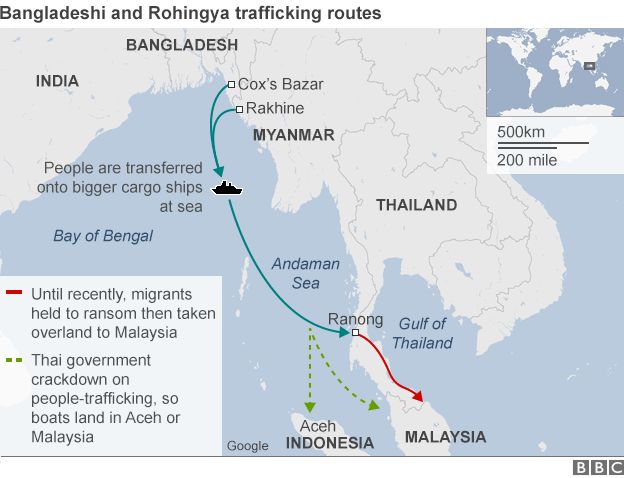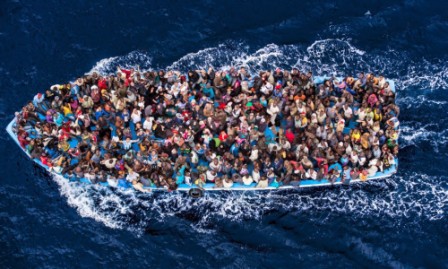Indonesia city 'needs help' to cope with migrant crisis
The Indonesian city where about 1,500 migrants have landed after being abandoned at sea says it urgently needs help to care for them.
rn
The mayor of Langsa, in Aceh province, told the BBC that finances were tight.
rn
"We need some help, immediately, from our national government or any other institution," said Usman Abdullah.
rn
Thousands of people, fleeing persecution and poverty, are thought to be adrift in seas in Southeast Asia.
rn
No country is willing to take in the migrants - who are mainly from the Rohingya ethnic minority in Myanmar. Only those whose boats sink or who reach land are being given shelter.
rn
Thailand, Malaysia and Indonesia have all been turning boats away, after giving them water and food.
rn
Last week, Indonesian fishermen saved about 700 migrants from their sinking boat and brought them to Langsa.
rn
Mr Abdullah said officials were using funds allocated for other uses to look after them and other migrants that had come ashore earlier.
rn
"We [are temporarily financing] this humanitarian aid from our city budget. But in fact we have no budget for relief or emergency aid," Mr Abdullah told the BBC's Indonesian service.
rn
"Our [financial] source is tightly limited actually."
rn
Mr Abdullah said he had heard some aid groups were ready to help but that the city had not received any relief yet.
rn
Malaysia 'cannot be burdened'
rn
The migrants are mostly Rohingya Muslims from Myanmar, who have paid people smugglers to get to them to Malaysia where they hope to find work.
rn
But Malaysia says it has taken in tens of thousands of Rohingya over the past few years and cannot cope with more.
rn
Prime Minister Najib Razak said on Sunday that Malaysia was "very sympathetic towards those who were floating in the open seas" but that it "must not be burdened with this problem as there are thousands more waiting to flee from their regions".
rn
Officials from the three countries are due to meet on Wednesday to discuss the crisis, and have stressed that Myanmar must play a role in stopping the migrants fleeing in the first place.
rn
Myanmar, however, is refusing to accept blame for the crisis, and has said it may not attend the conference.
rn
Why has this crisis erupted?
rn
 rn
rn
- rn
- Rohingya Muslims mainly live in Myanmar - largely in Rakhine state - where they are not considered citizens and have faced decades of persecution. rn
- Rights groups say migrants feel they have "no choice" but to leave, paying people smugglers to help them. The UN estimates more than 120,000 Rohingyas have fled in the past three years. rn
- Traffickers usually take the migrants by sea to Thailand then overland to Malaysia, often holding them hostage until their relatives pay ransoms. rn
- But Thailand recently began cracking down on the migrant routes, meaning traffickers are using sea routes instead, often abandoning their passengers en route. rn
Why are so many Rohingya stranded at sea?
rnAid groups say there are still thousands of migrants stranded at sea and that the situation is becoming increasingly desperate.
rnThe group rescued off Aceh told the BBC that about 100 had died among them after a fight broke out on board over the last remaining food. Three men separately said people were stabbed, hanged or thrown overboard.
rnMeanwhile, at least five boats, together carrying up to 1,000 people, are also reported to have been moored off the coast of Myanmar's Rakhine state.
rnThe UN, which considers the Rohingya one of the most persecuted ethnic groups in the world, has urged all parties to uphold their obligation to help anyone in distress at sea.
rnrn
Related Posts

